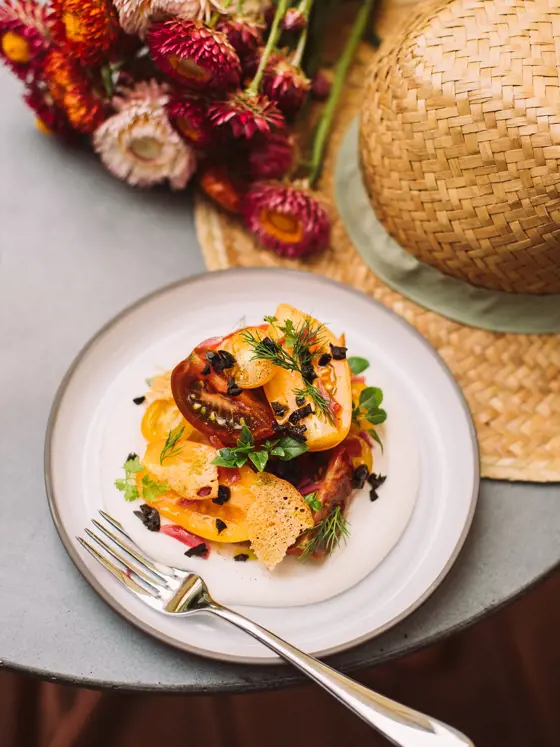
What prompted you to make Magari Italian? Was it worth leaving French cuisine for Italian comfort food?
Every cuisine, be it Italian, French, Spanish, or English, is based on certain fundamental principles. The French one is the epitome of a classic cuisine where numerous foundational techniques and recipes originated; once you know it, you can go in any culinary direction imaginable. Let’s take shortcrust pastry as an example—it’s similar in France, Italy, and Spain, isn’t it? So, if you know the basics, all you need to do is turn to produce representative of a given cuisine. We’re not orthodox; while Magari draws on Italian cuisine heavily in terms of recipes and blends, we do not shy away from using local and seasonal products. For this reason precisely, you won’t find eighteen pizzas, twenty pastas, and the chopped-tomatoes-with-mozzarella-type caprese in our menu. The idea is by all means Italian, but with the focus on the product—its preparation and conceptualization. We aim higher.
When I think of the PURO philosophy, it seems that all your restaurants are open to non-hotel residents. With all those Italian restaurants in Warsaw, why should people choose yours?
We say no to dull commercial Italian cuisine and ready-made grissini—the so-called shortcuts to Italy. We welcome our guests with saffron aioli, our special take on the classic aioli with a bit of basil-infused olive oil. Ritually, the waiter pours green olive oil around yellow mayonnaise, so, as you can see, we immediately treat our guests to plates full of beautifully contrasting colors. Also, we make our own focaccia with rosemary and flower of salt as well as our own grissini. Instead of following set patterns, we do our best to create our own, outstanding concept and quality.
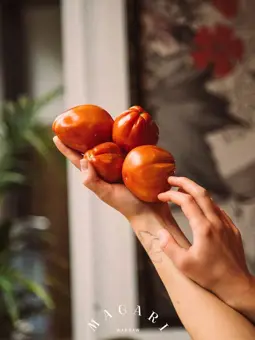
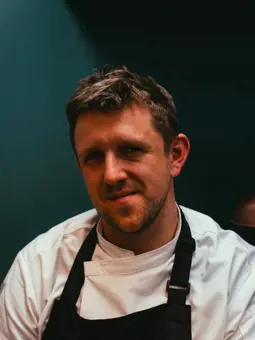
If, as you say, you don’t serve dozens of pizzas and pastas, what can visitors found on the menu?
Cold starters such as tartare, which has already gained a bunch of fans and is likely to stay with us for longer. We serve it a bit differently—with delicious olives that give it an interestingly sour flair and strengthen umami notes, and mayonnaise with tomatoes and tarragon. We have two soups on the menu—one of them being a strong and clear broth, and a cold soup in the summer—our latest menu will offer a white cold soup made of tomatoes based on tomato must. Then we have four pasta options, four pizzas, four main courses and three to four desserts. What we do, then, is build on simple formulas. The menu will always feature short pasta such as casarecce or trofie di Liguria and a long one such as pappardelle or spaghetti alla cacciatora. What I call “freakier” options are served too, for example risottos, gnudies, or ravioli. When I think about pasta sauce, I think about trios: one of them is buttery, the second is a tomato sauce, and the third one is with olive oil. I do it because I want everyone to find something for themselves; we do not think about our menu with hotel guests in mind, not exclusively. We think about anyone who may want to visit us in Warsaw and knows where to get quality Italian cuisine. We’re here to give them something extraordinary.
The menu has plenty of Polish touches to it, doesn’t it?
I don’t see the logic in bringing tomatoes from Italy if we have delicious Polish tomatoes and it’s peak season. We will be changing the menu in two or three weeks and a lot of tomato-based dishes are coming. I wouldn’t really refer to these products as quintessentially Polish; they’re just seasonal. Italy, if you think of it, is so culinarily diverse that, in the regions closes to Austria we’ll find a lot of similarities between Polish and Italian cuisines.
Let’s move on to one of your favorite parts of the menu—desserts.
I keep saying that I like nice compositions. When you prepare meat or fish it is really important to do it well from the technical angle. You don’t want to shape meat into circles or flowers; out of respect for animals whose lives have been sacrificed we must fully use the potential of the product. Desserts are often neglected and that’s not good for the palate. I think there’s nothing worse than the moment when you’ve had a good starter, magnificent main course, and a glass of top-quality wine, and all that’s left is a mediocre dessert, incomparable with the rest. First and last impressions prevail, which is why the strength of the last element is as important as that of the former ones. Confectionery and the art of baking allow for balancing between tastes, forms, textures, and temperatures. At Magari, we serve a light and original version of tiramisu since we want to keep the pleasure of eating after the first two bites...We prepare it by layering two almond sponge cakes with cream made of mascarpone, yolks, and sour cream (without stabilizers!), putting a dark chocolate disc on top and sprinkling everything with natural cocoa and grated almonds. The cake is then served with coffee ice cream and hot chocolate-amaretto sauce. We also have cannoli, but I’ve decided to use less sugar to make it more in keeping with Polish tastes. They’re served with pistachio ice cream instead of traditionally chopped pistachios. Last but not least, we offer panna cotta, but with a twist, of course; we make it out of fresh, acidulant buttermilk and serve with limoncello sorbet with raspberries and basil.
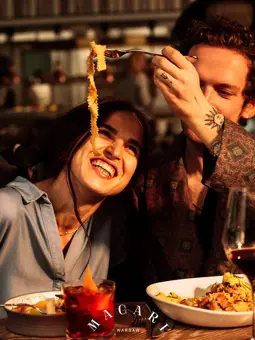
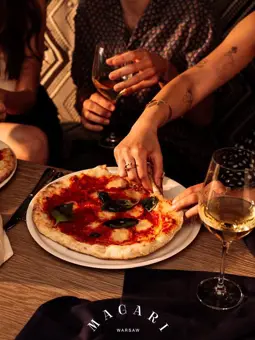
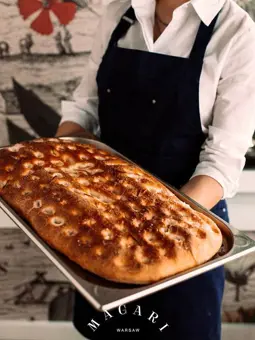

Will the menu continue to change?
Some dishes, such as pizza or tartare, are staying for now because our guests like them. I work with young cooks who came with me from the previous restaurant and it means the world to me that they want to work and develop themselves by my side. So I have this ambitious task to not create a one menu to be followed all year long. I myself want to go forward too.
Congratulations on such an ambitious team!
This is really satisfying when someone approaches you and says “chef, let’s change something”. I think it’s crucial to stick to the season and what it gives you—top quality products at the best value. There’s no lying that it’s all a business after all and, at the end of the month, the numbers have to match. Buying strawberries in the season is logical, but a lot of people do not understand this, or so it seems. When I hear that someone orders frozen vegetables I am pissed! All you can have frozen in your kitchen is green beans, anything else is just scandalous!
How is it for you working in a hotel restaurant?
This is nothing new to me because I did start my professional career in a hotel, La Regina, where I worked with Paweł Oszczyk who is the current culinary director at PURO Hotels. I’m well-versed in hotel routines—serving breakfast, then lunch, some conferences and banquets in between, regular service, dinner. What is difficult is accommodating to uneven numbers of guests, dependent on a lot of variables. You have to think through the ingredients policy because the hotel works on a much higher scale than a regular restaurant. You have to take into consideration that you serve 100 breakfasts in the morning and then expect a conference but you never allow yourself to take shortcuts. If we’re serving pasta, we make it from scratch, the same with ravioli and panna cotta...no ready-mades here.
Does it mean you spend more time poring over numbers in your office?
It takes time, but I feel confident because I have the team who has been with me for two-three years now. There are also people who started working with me again after long breaks. I can trust them because they know what standards I expect and I know that they aren’t spoiled with bad habits.
You mentioned Paweł Oszczyk. Could you tell us more about your professional relationship and what it looks like now, after all those years?
I’d say we have a great partnership. I started working as an intern in Paweł’s team and applied for a full-time job in the last year of high school. I think it’s valuable to have a mentor in life both with respect to professional and private beliefs. Family and religion are very important to me and I find it easier to connect with people who share these values. It’s also nice to talk to someone with a very strong position in the field and still be able to argue and defend your point of view; it’s not like Paweł comes, announces how something has to be done, and leaves. He listens and we both know that we’re continuously learning from one another. I would be making a mistake if I weren’t using Paweł’s experience—he worked in a top restaurant in Italy for a few years and knows what Italian cuisine is all about in terms of both products and philosophy. I see him as a mentor and partner and I know it’s mutual. If something goes wrong, the solution is simple—we’re not doing this anymore, changing that etc. For six years, I was a chef at Brasserie Warszawska, a place distinguished by the Michelin guide with a Bib Gourmand award (given to places promoting good value for money). Not so far ago, only two restaurants in Poland had it. I could put on airs thinking about all this, but that’s not what it’s all about. If I and Paweł have managed to stay partners for so long, it must be a true friendship.
Honesty is important to your cooking and to Italian cuisine. What does it really mean to you?
First of all, I cook what I would like to eat. I can’t think of a situation in which I cook something I don’t like only because it’s in vogue. For example, I would never serve a plate with a sauce splash. Next, there are products—I don’t want to put fifty different herbs on a plate so that a person doesn’t know what to do with them. Why would you do that? Two well-done ingredients that are tasty and, most of all, common, are enough. Let me tell you why I like cooking. It’s nice when you have a lot of “nothing” in your fridge but enough imagination and skills to end up creating a Coco Chanel boutique. Someone else would use the same “nothing” to create lecho.
text: Agnieszka Szydziak
*Mateusz Wichrowski – chef at Magari restaurant, PURO Warszawa. He worked in La Regina Hotel and finished several internships abroad. For six years prior to Magari, he was a chef at Brasserie Warszawska.
Magari Warsaw
Widok 9
00-023 Warszawa
opening hours: 12:00 - 22:30
Similiar Articles
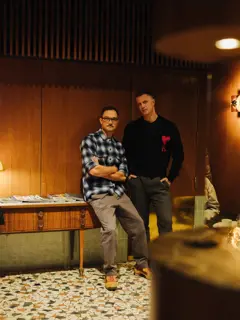
- Trend
- People
- Poland
Lukullus – delicious and beautiful pastries from Warsaw

- Trend
- Art
- People
- News
- Poland
Bielska Jesień – interview with Ada Piekarska, curator of poland's premier painting competition
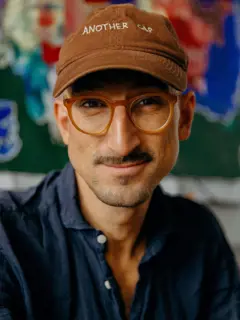
- Trend
- News
- People
- Poland
